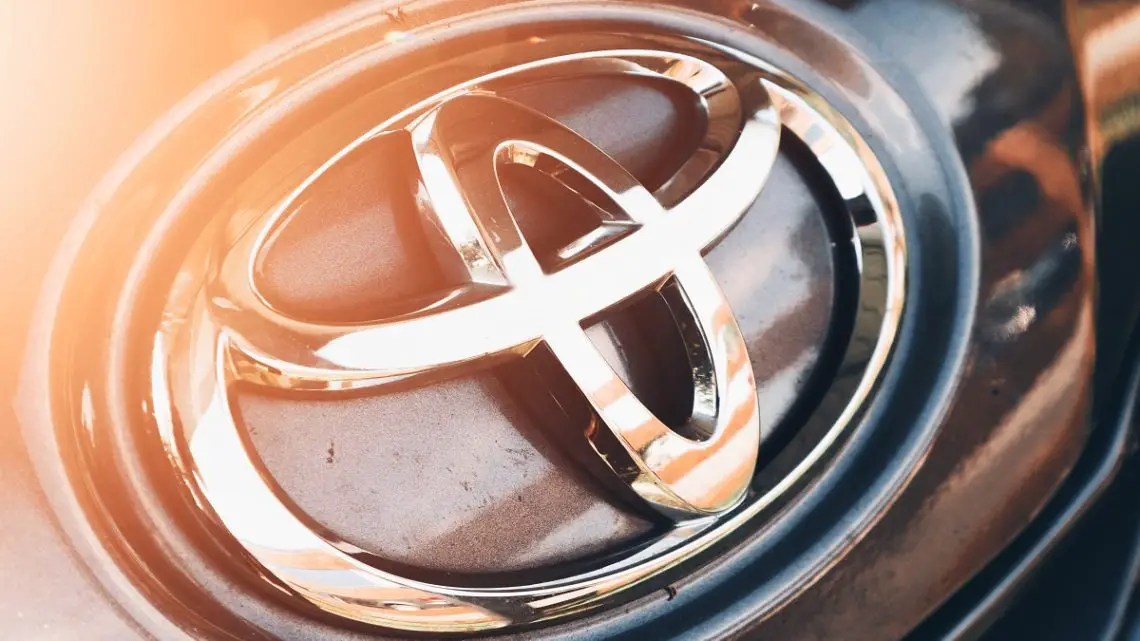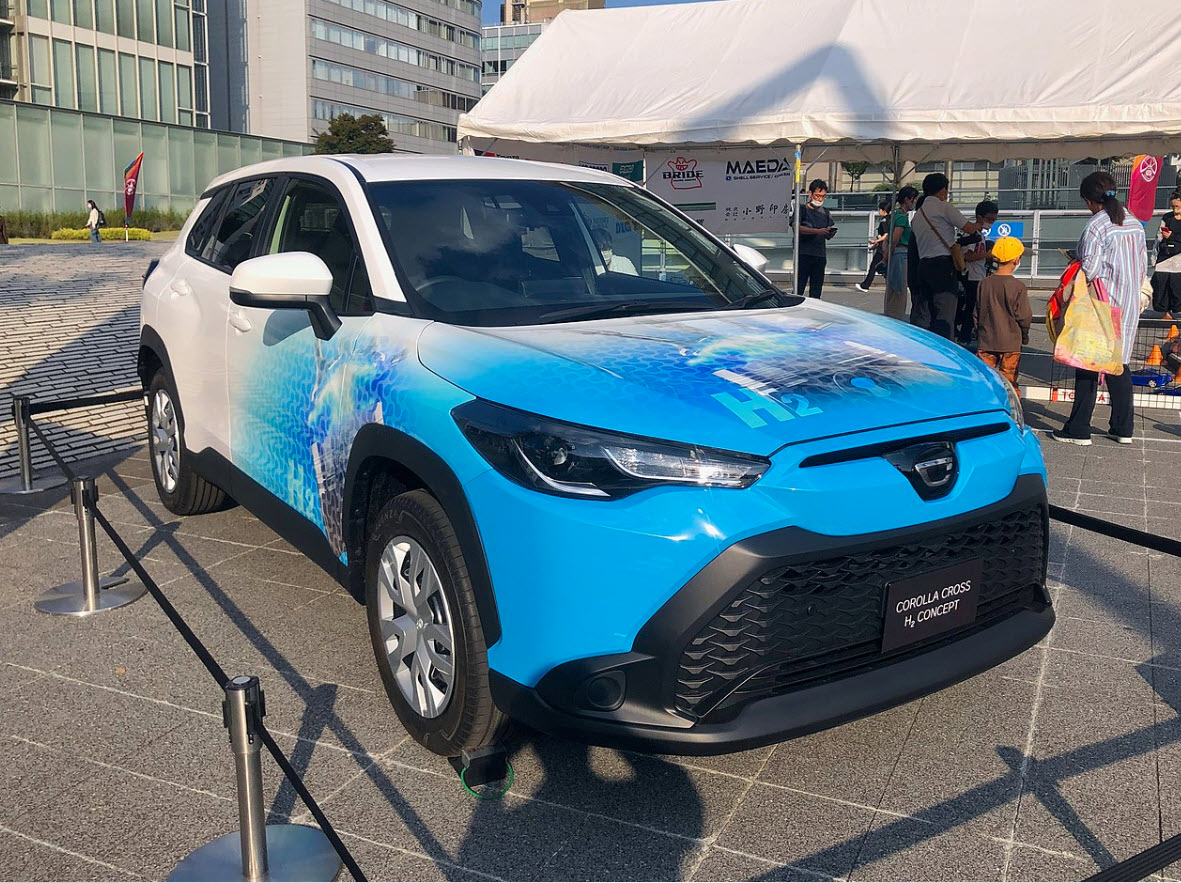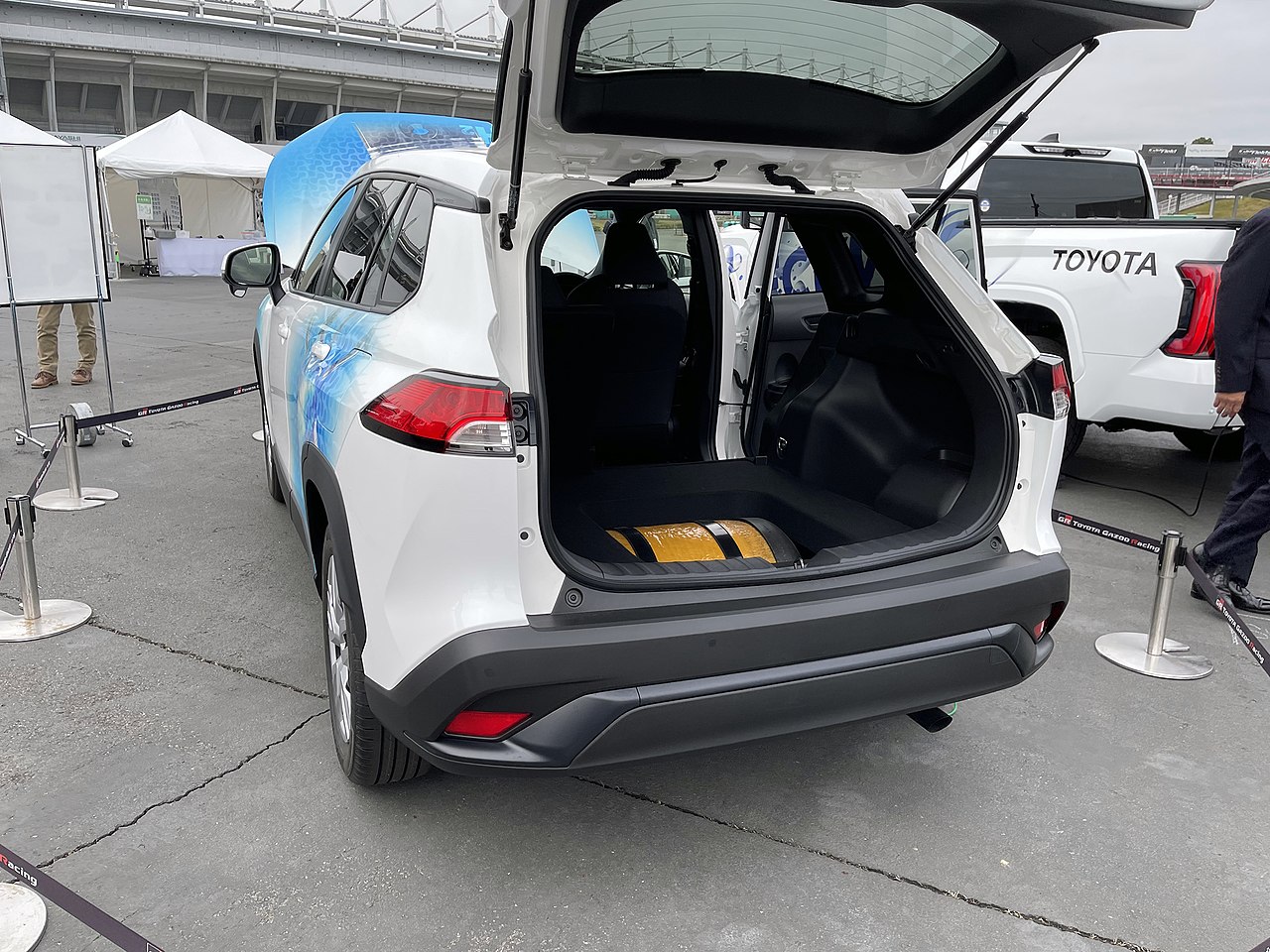
Toyota unveils prototype Corolla Cross hydrogen combustion engine car
December 12, 2022The concept vehicle was developed with an H2 tank and enough room for 5 passengers and luggage.
The engineering team at Toyota has recently unveiled a new prototype hydrogen combustion engine car called the Corolla Cross H2 Concept.
The vehicle is based on the GR Corolla equipped with a 1.6l 3-cylinder turbo engine.
That car was equipped with a hydrogen combustion engine with direct injection technology from motorsport activity, in addition to an H2 tank based on the expertise gained from the development and launch of the Mirai. This car has enough room for 5 passengers as well as their luggage.
Images Credit:KKPCW(Kyu3), CC BY-SA 4.0, via Wikimedia Commons
The new hydrogen car is still a prototype. Its evaluation under real world conditions is currently underway, even as its digital development is continuing. The car is slated to begin its winter testing in northern Japan very soon.
The hydrogen combustion engine design was chosen for a number of benefits it can provide.
Among the top advantages offered by H2 internal combustion engines (ICEs) is that they provide the capacity to leverage existing ICE technologies in addition to rapid refueling times and a notable decrease in the use and requirement for rare and expensive elements of which there is a limited supply, such as lithium and nickel (required for battery production). Adaptation of existing technologies and reaching further into existing investments gives H2 ICE tech the chance to provide a faster and more accessible carbon reduction solution, said Toyota.
According to the automaker it has arrived at approximately 40 percent of the distance along the road to commercializing vehicles such as the new Corolla Cross H2 Concept. There is no way to tell at this point if the tech will reach mainstream use in the passenger vehicle market, but Toyota is highly confident in the opportunity it presents in motorsports.
Earlier in 2022, Toyota took part in all Super Taikyu endurance races in Japan (by way of the Rookie Racing team) using the GR Corolla H2 with a hydrogen combustion engine. Throughout the events, Toyota President Akio Toyoda drove in every race under the master driver pseudonym “Morizo”, providing him with a firsthand opportunity to evaluate and contribute to the vehicle’s development.
 Tokumeigakarinoaoshima, CC BY-SA 4.0, via Wikimedia Commons
Tokumeigakarinoaoshima, CC BY-SA 4.0, via Wikimedia Commons
Hydrogen FAQ’s – Hydrogen Toyota Corolla
Q1: What is the Toyota Corolla Cross H2 Concept?
A1: The Toyota hydrogen combustion engine car is a prototype that was recently unveiled by Toyota’s engineering team. This vehicle is based on the GR Corolla and is equipped with a 1.6l 3-cylinder turbo engine.
Q2: How does the hydrogen combustion engine work in this concept vehicle?
A2: The car is equipped with a hydrogen combustion engine with direct injection technology from motorsport activity. It also has an H2 tank, which is based on the expertise gained from the development and launch of the Mirai.
Q3: What is the passenger and luggage capacity of the Corolla Cross H2 Concept?
A3: This concept car has enough room to comfortably accommodate 5 passengers and their luggage.
Q4: Is the H2 vehicle ready for commercial use?
A4: The new H2 vehicle is still a prototype. Its evaluation under real-world conditions is currently underway, and its digital development is continuing. According to Toyota, it has covered approximately 40 percent of the journey towards commercializing vehicles like the new Corolla Cross H2 Concept.
Q5: Why was the hydrogen combustion engine design chosen for this vehicle?
A5: The hydrogen combustion engine design offers several benefits. It leverages existing internal combustion engine technologies, allows for rapid refueling times, and reduces the use of rare and expensive elements like lithium and nickel, which are required for battery production.
Q6: Has the Corolla Cross H2 Concept been tested in any racing events?
A6: Yes, earlier in 2022, Toyota took part in all Super Taikyu endurance races in Japan using the GR Corolla H2 with a hydrogen combustion engine. Throughout the events, Toyota President Akio Toyoda drove in every race, giving him a firsthand opportunity to evaluate and contribute to the vehicle’s development.




 With over 15 years of reporting hydrogen news, we are your premier source for the latest updates and insights in hydrogen and renewable energy.
With over 15 years of reporting hydrogen news, we are your premier source for the latest updates and insights in hydrogen and renewable energy.
GAME CHANGER!!! NOT IF….IT WILL BE MAINSTREAM AS NOW AM INCENTIVIZED TO CREATE H2 HIGHWAYS GLOBALLY. TOYOTA THROE THE FIRST PUNCH AT FOSSIL FUEL/oil companies….ALL OF US WILL NOW ENTER THE FIGHT!!!
Actually this prototype may rescue the oil companies from extinction, Hydrogen infrastructure will need gas stations and distribution networks and stations that those companies already have, they just need to replace some of the diesel/gasoline pumps with tanks and pumps hydrogen, additionally those companies could start producing grey H2 capturing the CO2 emisions, later they can transition to blue and green H2, Oil companies MUST BE part of the solution not just the problem
If i had a ready supply of Green Hydrogen how many vehicles could you supply to my company?
I would love to buy that hydrogen Toyota corolla cross for the all benefits it offer.
Me too!!!!
Those who really want this new innovative design question and concern how will we be able to utilize quick refueling when stations are not within allowable distances. Bakersfield, CA.
Personally, I really want to be put on the waiting list. Concerns is the refueling stations.
I sure hope this works because we will become a toxic waste dump with electric cars
There is a reserch company name LT Langenburg at Oregon, Eugene USA, founded by Prof. DR. Max Langenburg, be founded the turbin engine for power plant, that was powered by water…just water…and succed already in 2014
agreed about batteries. It is also a missperception that maintaining a grid of cables and poles requiring over 10000 poles /province /year is green. Add the heavy equipment , manpower to cut trees back , repair/replace annually and you have a large ammount of fossil fuel consumption in just electrical transmission infrastructure
not even considered in the green energy assessment. Now thats science.. just leave
out the nasty variables and we are good
I agree with you.
New battery recycling technologies will not produce toxic waste.
Hydrogen production now is mainly from fossil fuels, so currently, until green hydrogen production is in full swing, hydrogen is not a viable short term answer for addressing climate change and reducing greenhouse gases.
It will be interesting to understand how this compares in wight and range for a given volume of hydrogen to a fuel-cell vehicle of similar capacity. I’m assuming it will be somewhat lighter, which will potentially make up for the lower conversion efficiency of the ICE vs the fuel cell.
Also the big one – what is the relative cost compared to a FCEV?!!
Get this vehicle into the hands of the average driver if you want exacting feedback for your development. The average driver will tell you exactly what works and exactly what doesn’t. The average driver will tell you that equipment such as driverless driving options, automatic traction control and shutting an engine down at every stop light are NOT in every drivers frontal lobe. I.e. do we really need traction control on a 25mph, dry pavement every time the engine starts. Cost efficient fuel, minimum maintenance and dependability are but a few suggestions this average driver would suggest as a minimum.
Green hydrogen in commercial quantities won’t be available until fusion reactors become available. 95% of the commercial hydrogen today is produced by reforming hydrocarbons
Carbon dioxide is a main byproduct.
There’s got to be something better than electric vehicles. Hydrogen and Hydrogen alternatives i.e. green ammonia that converts to hydrogen are liquefied products that mimic the standard fossil fuel car. Where as the fossil fuel car is the standard in practicality and right now cost. Meet it or bet it or get out of the kitchen all together!
If we want “green” hydrogen, where will it come from? The Western United States has been in a drought for at least 12 years. There is not enough water. Companies do not want to have to ship hydrogen from California to the to the southwest, neither did they want to ship it from the Northeast or the Gulf states to the southwest. And look at the central United States. The Mississippi River drains 32 states. And it’s drying up. There’s not enough water. I am not in favor of burning gasoline. I am not in favor of battery power, because of the very issues of precious metals and rare earth has to be used in batteries. Batteries. What is the solution? Where will the hydrogen come from?
Put me down as a very interested potential owner – or trialling driver, if Toyota is looking for public evaluation & feedback in Australia.
I’m also quite interested in the answer to Mike Lipscomb’s query from 14Dec regards the relative efficiencies of an H2 ICE engine versus a Fuel Cell/motor combo; and likely cost comparison.
Hi I for Hydrogen have for Hydrogen Generators A Dale Forsyth
Very Very interested. Heard a few years back that Toyota discontinued Tesla software and was going in the green direction. The world needs hydrogen fuel, desalination capabilites. There’s an imminent danger in Batteries discarded and current carbon monoxide.
Brilliant way forward. EV infrastructure and range issues will never compete with ICE. The sheer cost of mining and depletion of rare earth metals is never factored into the EV argument. Toyota are onto something very big with HC and given their track record can make this work, The average driver without access to a home charging point will find this very interesting, me included.
currently i’m working on hydrogen energy my current project is to produce 70liter hydrogen per minute but the actual problem is we can’t use hydrogen as full fuel however hydrogen can increase the life of engine and also this will help to De-carbonizing the environment.